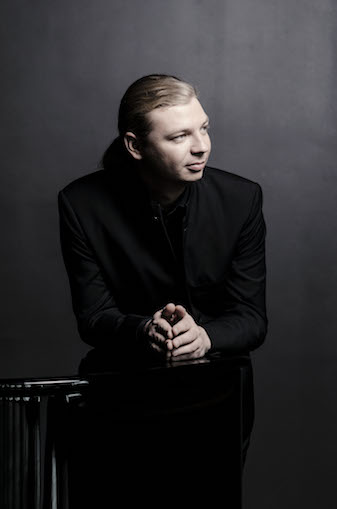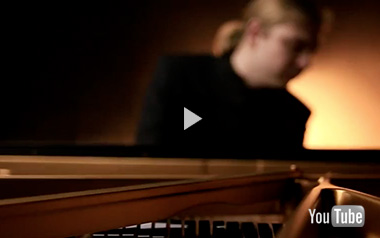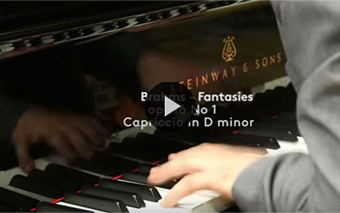Next Concerts
Jul 30, 2024
Festival Pablo Casals de Prades
Aug 1, 2024
BBC Prom, Royal Philharmonic Orchestra with Vasily Pentrenko
London, United Kingdom
Ravel: Piano Concerto in G major
Venue: Royal Albert Hall
Reviews
August 1st, 2010
Queen Elisabeth Competition
“Denis Kozhukhin performed Haydn’s Sonata in E flat major Hob. XVI:49 with such subtlety, such carefully-judged pacing and such attention to detail that one felt transported back to the Classical period. His rendition of ‘Target’, too, came across as a thoughtfully conceived interpretation. But it was his rendition of Prokofiev’s Second Concerto that stole the show – and the competition. The work evolved like an epic journey, and throughout everything was perfectly paced so that dramatic climaxes were unleashed with force of a tornado.”
– International Piano Magazine, July/August 2010
“It rapidly became obvious to both audience and jury during Denis Kozhukhin’s performance that he unquestionably had that certain ‘je ne sais quoi’, so impossible to define, which characterises a truly musical personality, standing head and shoulders above the competition, talented though they all were.
To begin, Kozhukhin played Haydn’s piano sonata in E flat major. He played with such serenity and mastery of both technique and effects; every element of the sonata was given its proper place. After an opening of extreme lightness, delicacy and tenderness, the tone grew in richness. This was followed by the set work, ‘Target’, by the 23 year old Korean composer Jeon Minje. In this complex piece of multiple realities and percussive impressions, Denis Kozhukhin really made himself heard. Not just in the literal sense, but in the figurative sense also, giving a highly personal performance of a work which he had made his own in the space of just one week. His final piece, like two other competitors, was Prokofiev’s 2nd piano concerto. He had such presence and such authority; inspiring an orchestra and a conductor who had not always shared the artistic vision of and close relationship with the other candidates. In a wonderful dialogue with the orchestra, Kozhukhin revealed the many facets and treasures of this concerto, which in turn revealed what a marvellous musician Kozhukhin himself is.”
– Luxembourger Wort, May 2010
“As his performance progressed, it became more and more obvious that Kozhukhin paired his musicality with an integrity and a humanity that guard him from the danger of becoming a piano-playing machine. His inner calm never deserted him, even in the wild developments of Prokofiev’s 2nd piano concerto, or the series of percussive chords in the set piece ‘Target’ by Jeon Minje. The Orchestre National itself was won over by his natural authority, and delivered a faultless performance for him, allowing him to deploy his full range of aural wizardry – but in his own particular style; simple and devoid of superfluity. The various phrases in the Haydn sonata were imbued with colour, and responded one to another other in perfectly balanced dialogue between right and left hands. Both the pieces and the overall programme showed an intelligence of construction, building an arch from the alpha of the Haydn to the omega of the Prokofiev. By 11.30pm on Saturday 29th May, there could be no doubt: the Queen Elisabeth piano competition of 2010 had found its winner.”
– Le Soir, May 2010
“Denis Kozhukhin was incontestably the winner. Those who had already heard him in the semi-finals had singled him out. … and we sensed from the very first bars of his initial Haydn sonata that he was indeed outstanding: a true musician, in fact. His technique, his virtuosity, his complete control of the tone and the clarity of his interpretation were means to serve the music, and not ends in themselves.
He demonstrated a calm maturity, and entered into a real dialogue with the orchestra in Prokofiev’s 2nd piano concerto, spurring them on. This was a magnificent partnership between soloist and orchestra. Kozhukhin was also clearly very aware of, and motivated by, the audience’s presence, and built up a wonderful relationship with them.”
– La Voix, May 2010
“Denis Kozhukhin’s win is incontestable, and is compounded by his incredible popular success. The Russian pianist plotted a flawless route through the competition, where his radiant musicality was unceasingly served by stunning technical mastery. There is a joy in his playing which drives him right to the very essence of the possibilities contained within a score.
At the age of only 23, he is already in the company of the greats with his combination of moral strength and gentleness.”
– Le Soir, May 2010
“It is very difficult to sum up (or indeed analyse) Denis Kozhukhin’s playing in writing. His performance of Haydn’s piano sonata in E flat major, Hob.XVI:49, was the very essence of clarity, simplicity and wit. But why? Was it the tone? The tempo? We weren’t hearing a particular pianistic timbre, but rather the voice of someone speaking, or of a soul expressing itself. But if you listened carefully, you could identify a peaceful tone, full of nuance, colour and intensity; faithful in the utmost to the score. The tempo was simply right – slower than the extravagant speeds we had encountered over the past weeks from other competitors – a sign that the pianist felt connected with the composer’s intentions, and was confident in his interpretation. The final minuet, simple in the extreme (even a beginner could play it) was simply electrifying, and was followed by complete silence from the audience.
Kozhukhin’s was the 12th interpretation of ‘Target’ to be heard, which incidentally wasn’t played from memory by any of the competitors. His performance revealed what could well be the piece’s defining structure: a succession of individual tableaux, each with its own characteristic ambience, and through which the visionary power of the pianist unveiled a hitherto undiscovered lyricism and an overbearing tension (like a galvanised Marin Alsop!). After a sombre and inspired cadence came a dazzling conclusion.
Kozhukhin gave the second performance of Prokofiev’s 2nd piano concerto that night; it was similar to that of Claire Huangci in its interpretation, but at the polar opposite in its energy. From the opening melody, Denis whisked all those around him – conductor, orchestra, audience and jury – off on an epic adventure whose itinerary, although theoretically familiar, gradually seemed to enter the unknown. The scherzo had an integrity of its own, delivered without excessive haste, like a dream. The intermezzo was taken to the edge of the extreme: a dance for bears who finally took their leave on the tips of their toes. The finale was broad, powerful, at its ease, and organically connected with the orchestra; the final presto was dazzling. Kozhukhin received a standing ovation from an enraptured audience.”
– La Libre Belgique, May 2010


